- Home
- Hermann Hesse
Klingsor's Last Summer
Klingsor's Last Summer Read online
The author and publisher have provided this e-book to you for your personal use only. You may not make this e-book publicly available in any way. Copyright infringement is against the law. If you believe the copy of this e-book you are reading infringes on the author’s copyright, please notify the publisher at: us.macmillanusa.com/piracy.
Contents
Title Page
Copyright Notice
A Child’s Heart
Klein and Wagner
Chapter 1
Chapter 2
Chapter 3
Chapter 4
Chapter 5
Klingsor’s Last Summer
Preface
Klingsor
Louis
The Day at Kareno
Klingsor to Edith
The Music of Doom
Evening in August
Klingsor writes to Louis the Cruel
The Self-portrait
By Hermann Hesse
Copyright
A Child’s Heart
SOMETIMES WE ACT, go in and out, do this and that, and everything is easy, casual, and unforced; seemingly it could all be done differently. And sometimes, other times, nothing could be done differently, nothing is unforced and easy, and every breath we take is controlled by some outside power and heavy with fate.
What we call the good deeds of our lives, the ones we find easy to tell about, are almost all of that first, “easy” kind, and we easily forget them. Other acts, which we find hard to talk about, we never forget; they seem to be more ours than the others, and they cast long shadows over all the days of our lives.
Our father’s house stood tall and bright on a sunlit street. You entered it through a high gate and at once found yourself embraced by coolness, dusk, and stony moist air. A high dark hall silently received you; the red sandstone squares of the flooring led at a slight incline to the stairs, which lay far at the rear, in semidarkness. Many thousands of times I entered through that high gate, and never did I pay attention to gate and hallway, stone flooring and stairs. For these were always merely a passage into another world, “our” world. The hall smelled of stone; it was dusky and high. At the rear of it, the stairs led up out of the dim coolness into light and bright coziness. But the hall and the somber duskiness always came first. There was something of Father about it, something of dignity and power, something of punishment and guilty conscience. A thousand times I passed through, laughing. But sometimes I stepped inside and at once felt crushed and reduced, afraid, and I hurried to the liberating stairs.
One day when I was eleven years old I came home from school. It was one of those days when fate lurks in the corners, when something can easily happen. On such days every failing and disturbance in our own souls seems to be reflected in our surroundings, distorting them. Uneasiness and anxiety grip our hearts, and we seek and find their presumed cause outside us. We see the world as ill arranged and are met by obstacles everywhere.
That was how it was on that day. From early morning on, I was dogged by a sense of guilty conscience. Who knows what its source was—perhaps dreams of the night. For I had done nothing particularly bad. That morning my father’s face had worn a suffering and reproachful expression. The breakfast milk had been lukewarm and insipid. Although I had not run into any trouble at school, everything had once more felt dreary, lifeless, and discouraging; everything had combined to form that already familiar feeling of helplessness and despair which tells us that time is endless, that eternally and forever we shall be small and powerless and remain under the rule of this stupid, stinking school, for years and years, and that this whole life is senseless and loathsome.
I had also been vexed by my best friend on that day. Lately I had struck up a friendship with Oskar Weber, the son of a locomotive engineer, without really knowing what drew me to him. He had recently boasted that his father earned seven marks a day, and I had answered at random that my father earned fourteen. He had let that impress him without argument, and that had been the beginning of the thing. Before the week was out I formed a league with Weber. We set up a joint savings account to be used later to buy a pistol. The pistol was displayed in a hardware shop’s window, a massive weapon with two blued steel barrels. And Weber had calculated that we only had to save hard for a while and we would be able to buy it. Money was easy to come by; he was often given ten pfennig for errands, or picked up a tip here and there, and sometimes you found money on the street, or things worth money, like horseshoes, pieces of lead, and other things that could be easily sold. Moreover, he promptly contributed a ten-pfennig piece for our savings, and that convinced me and made our whole plan seem both feasible and hopeful.
As I entered the hall of our house that noon and in the cool, cellarlike air felt dark admonishments of a thousand bothersome and hateful things and systems wafting into my face, my thoughts were preoccupied with Oskar Weber. I felt that I did not love him, although I rather liked his good-natured face, which reminded me of a washerwoman’s. What attracted me to him was not himself but something else—I might say, his class. It was something that he shared with almost all boys of his type and origins: a kind of cheeky facility with life, a thick skin that protected him from danger and humiliation, a familiarity with the small, practical affairs of life, with money, stores and workshops, with goods and prices, with kitchens and laundries and things of that sort. Boys like Weber, who seemed impervious to the blows dealt out in school, who were kindred to and friendly with hired hands, draymen, and factory girls, stood differently and more securely in the world than I did. They knew how much their fathers earned in a day and undoubtedly knew many other things about which I was wholly inexperienced. They laughed at expressions and jokes that I did not understand. Altogether, they could laugh in a way that was closed to me, in a filthy and coarse but undeniably grownup and “manly” way. It did not help that I was smarter than they and knew more in school. It did not help that I was better dressed, combed, and washed. On the contrary, these very differences were to their credit. It seemed to me that boys like Weber could enter without trouble into the “world,” as it appeared to me in a nimbus of strangeness and glamour, while the “world” was so utterly closed to me that I would have to conquer each of its gates by a wearisome, endless process of growing older, sitting in school, examinations, and upbringing. It was only natural that such boys also found horseshoes, money, and pieces of lead in the street, that they were paid for errands, received all sorts of gifts in shops, and thrived in every possible way.
I felt obscurely that my friendship with Weber and his savings was nothing but a wild longing for that “world.” There was nothing lovable about Weber but his great secret, by virtue of which he stood closer to adults than I did and lived in a more naked, less veiled, more robust world than I did with my dreams and wishes. And I sensed beforehand that he would disappoint me, that I would not be able to wrest from him his secret and the magic key to life.
He had just left me and I knew he was now on his way home, thickset and smug, whistling and cheerful, troubled by no longings, no forebodings. When he met the housemaids and factory girls and saw them leading their mysterious, perhaps wonderful, perhaps criminal life, it was no mystery to him, no vast secret, no danger; it was nothing wild and exciting, but as natural, familiar, and homelike as water is to a duck. That was how it was. And I, for my part, would always stand outside, alone and uncertain, full of intimations but without certainty.
Altogether, on that day life once again tasted hopelessly pallid. The day had some of the quality of a Monday, although it was a Saturday. It smelled of Monday, three times as long and three times as dreary as the other days. Life was damned and disgusting, horrid and full of falsehood. The grownups acted as if t
he world were perfect and as if they themselves were demigods, we children nothing but scum. These teachers…! I felt striving and ambition within myself; I made sincere and passionate efforts to be good, whether in learning the Greek irregular verbs or in keeping my clothes clean. I struggled to achieve obedience to my parents or silent stoicism before all pain and humiliation. Again and again I rose up, ardent and devout, prepared to dedicate myself to God and to tread the ideal, pure, noble path toward the heights, to practice virtue, to suffer evil silently, to help others. And alas, again and again it remained only a beginning, an attempt, a brief fluttering flight! Again and again, after a few days, even after a few hours, something happened that should not have been allowed, something wretched, depressing, and shaming. Again and again, in the midst of the noblest and staunchest decisions and vows, I fell abruptly, inescapably, into sin and wickedness, into ordinary bad habits. Why was it this way? Why could I recognize so clearly the beauty and rightness of good intentions, could feel them so deeply within my heart, when all of life (including the adults) reeked everlastingly of ordinariness and everything was so arranged that shabbiness and vulgarity triumphed? How could it be that in the morning, on my knees at my bedside, or at night before lighted candles, I could pledge myself to goodness and the light, could appeal to God and renounce all sin forever and ever—only to commit, perhaps but a few hours later, the most wretched betrayals of this same solemn oath and sincerest resolution, if only by chiming in with tempting laughter, or by lending an ear to a stupid schoolboy joke? Why was that so? Was it different for others? Had heroes, the Romans and Greeks, the knights, the first Christians—had all these others been different from myself, better, more perfect, without bad impulses, equipped with some organ that I lacked, which prevented them from forever falling back from heaven into everyday life, from the sublime into inadequacy and wretchedness? Was original sin unknown to heroes and saints? Was holiness and nobility possible only for a few rare, elect souls? But why, if I were not one of the elect, why was this impulse toward beauty and nobility innate in me? Why did I have this wild, painful longing for purity, goodness, and virtue? Was I being made mock of? Could it possibly be, in God’s world, that a person, a boy, would simultaneously have all the sublime and all the evil impulses within himself and be forced to suffer and despair, to cut an unhappy and ridiculous figure, for the amusement of God as he looked on? Could that be so? Rather, wasn’t—yes, wasn’t the whole world a joke of the devil that ought to be spewed out? If that were so, then was not God a monster, insane, a stupid, horrible prankster?… And even as I had this thought, with a faint savor of voluptuous delight in rebellion, my fearful heart punished me for the blasphemy by pounding furiously!
How clearly I see, after thirty years, that stairwell with the tall opaque windows giving on the wall of the house next door and casting so little light, with the white-scoured pine steps and risers and the smooth wooden banister polished from my innumerable sliding descents. Distant as my childhood is, and incomprehensible and fabulous though it seems to me on the whole, I still sharply remember all the suffering and doubts I felt at the time, in the midst of happiness. All those feelings existed in the child’s heart, where they have been ever since: doubt of my own worth, vacillation between self-esteem and discouragement, between idealistic contempt for the world and ordinary sensuality. And just as I did then, I later continued to regard these aspects of my nature sometimes as a miserable morbidity, sometimes as a distinction. At times I believed that God wished to lead me on this painful path to a special isolation and deepening of my nature, at other times I took it all as nothing but the signs of shabby weakness of character, of a neurosis such as thousands of people bear wearisomely through their lives.
If I were to reduce all my feelings and their painful conflicts to a single name, I can think of no other word but: dread. It was dread, dread and uncertainty, that I felt in all those hours of shattered childhood felicity: dread of punishment, dread of my own conscience, dread of stirrings in my soul which I considered forbidden and criminal.
At that hour I have been speaking of, this sense of dread once again struck me as I drew nearer to the glass door at the top of the stairs, where the light grew brighter and brighter. The feeling began with a tightness in my stomach that rose to my throat and there became a choking or gagging sensation. Along with this at such moments, and now also, I felt a painful sense of embarrassment, a distrust of all observers, an urge to be alone and to hide.
With this repulsive feeling, truly the feeling of a criminal, I entered the hall and then the living room. I sensed that the devil was afoot today, that something was going to happen. I sensed it as the barometer senses a change in the pressure of the air, with utterly helpless passivity. Ah, here it was again, the inexpressible horror. The demon was skulking through the house. Original sin gnawed at my heart. Vast and invisible, a ghost stood behind every wall, a father and judge.
As yet I knew nothing. It was all mere foreboding, a gnawing, anticipatory uneasiness. In such situations it was often best to fall ill, to throw up and go to bed. Then the dangerous time sometimes passed harmlessly; Mother or Sister came in, I would be given tea and felt surrounded by loving solicitude. I could cry or sleep, and afterwards waken sound and cheerful in a wholly transformed, relaxed, and bright world.
My mother was not in the living room, and only the maid was in the kitchen. I decided to go up to Father’s study at the top of a narrow flight of stairs. Although I was also afraid of him, it was sometimes good to turn to him whom I had to ask forgiveness for so many things. With Mother it was easier and simpler to find comfort; but Father’s comfort was more valuable. It meant peace with the judging conscience, reconciliation and a new covenant with the good powers. After nasty scenes, interrogations, confessions, and punishments I had often emerged good and pure from Father’s room, punished and reproved, to be sure, but full of fresh resolutions, strengthened by the pact with power against the evil enemy. I decided to visit Father and tell him that I was feeling ill.
And so I climbed the short flight of stairs that led to the study. These stairs, with their own special wallpaper smell and the dry sound of the light, hollow wooden treads, were infinitely more fraught with significance and fatefulness than even the entrance hall. Many important causes had led me up these steps; a hundred times I had dragged dread and a tormented conscience up them, or defiance and wild anger, and quite often I had returned down them with absolution and new security. In the dwelling below, mother and child were at home; the atmosphere was mild there. Up here power and spirit dwelt; up here were the courthouse and temple and the “realm of the father.”
Rather timidly, as always, I pressed down the old-fashioned latch and opened the door halfway. The smell of the paternal study flowed toward me, the familiar smell of books and ink, attenuated by blue air from half-open windows, by white, clean curtains, a faint dash of cologne water, and an apple on the desk. But the room was empty.
With a sensation half of disappointment and half of relief, I entered. I checked my thumping footsteps, walked on tiptoe, as we often had to up here when Father was napping or had a headache. And as soon as I became aware of how quietly I was moving, my heart began to pound and I again felt, intensified, the anxious pressure in my stomach and my throat. I moved on, skulking and frightened, took a step and another step, and already I had ceased to be a harmless visitor and petitioner and had become an intruder. More than once I had secretly crept into Father’s two rooms during his absence, had explored his secret realm, and twice I had filched something from it.
The memory of these thefts came at once and filled me, and I knew at once that disaster was upon me. Now something was going to happen, now I was doing something forbidden and evil. I had no thought of flight! Rather, I did think of it, thought fervently and longingly of running away, down the stairs and into my own room or into the garden—but I knew that I was not going to, that I could not. How I wished that my father might stir in the adjacen
t room and come in and break the terrible spell that held me in its grip. If only he would come! If only he could come, scolding for all I cared, but come before it was too late!
I coughed to announce my presence, and when there was no answer I called softly: “Papa!” All remained still; the many books on the walls gave no answer. A pane of the casement window moved in the wind, casting a glint of sunlight on the floor. No one redeemed me, and inside myself I had no freedom to do anything but the demon’s bidding. A feeling of criminality contracted my stomach and made my fingertips cold; my heart fluttered with dread. As yet I had no idea what I would do. I knew only that it would be something naughty.
Now I was at the desk. I picked up a book and read a title in English which I did not understand. I hated English—my father always spoke it with Mother when we children were not supposed to understand, and also when they were quarreling. In a bowl lay all sorts of small objects, toothpicks, pen points, tacks. I took two of the pen points and pocketed them. God knows why; I did not need them, had no lack of pens. I did it only to obey the compulsion that was almost choking me, the compulsion to do something bad, to harm myself, to load myself with guilt. I leafed through my father’s papers, saw a letter he had begun, read the words, “We and the children are very well, thank God,” and the Latin letters of his handwriting looked at me like so many eyes.
Then I stole softly into the bedroom. There stood Father’s iron army bed, his brown house slippers under it, a handkerchief on the night table. I inhaled the paternal air in the cool, bright room, and the image of my father rose plainly before my eyes, while reverence and rebellion contested in my overladen heart. For moments I hated him, remembering with spite and malice how he sometimes, on headache days, lay still and flat on his low cot, stretched out at great length, a wet towel on his forehead, sometimes sighing. Certainly I had an inkling that he too, for all his power, had no easy life; that he, of whom I stood in such awe, also experienced timidity and doubts of himself. In a moment my strange hatred evaporated and was followed by pity and sentiment. But in the meanwhile I had opened one of the drawers of his chest. There his linens lay in neat layers, and a bottle of cologne water, which he was fond of. I wanted to sniff it, but the bottle was still unopened and firmly capped; I put it back. Next to it I found a small round box of lozenges which had a licorice taste. I popped a few of them into my mouth. A sense of disappointment overcame me, and at the same time I was glad not to have found and taken anything more.

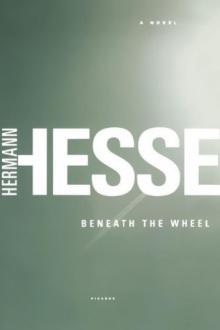 Beneath the Wheel
Beneath the Wheel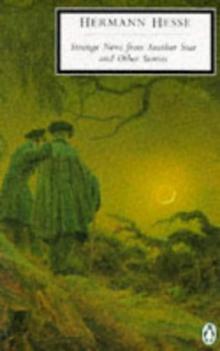 Strange News From Another Star
Strange News From Another Star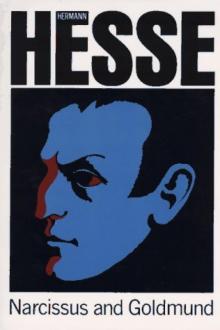 Narcissus and Goldmund
Narcissus and Goldmund Steppenwolf
Steppenwolf Siddhartha
Siddhartha Demian
Demian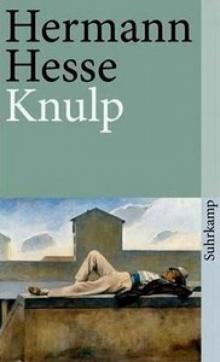 Knulp
Knulp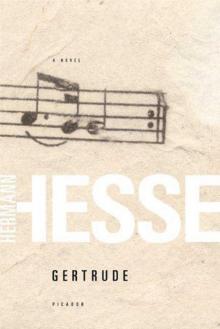 Gertrude
Gertrude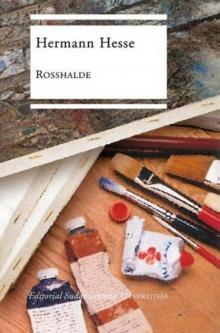 Rosshalde
Rosshalde The Glass Bead Game
The Glass Bead Game The Journey to the East
The Journey to the East Klingsor's Last Summer
Klingsor's Last Summer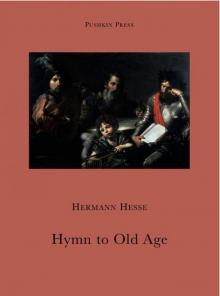 Hymn to Old Age
Hymn to Old Age Poems
Poems The Fairy Tales of Hermann Hesse
The Fairy Tales of Hermann Hesse Singapore Dream and Other Adventures
Singapore Dream and Other Adventures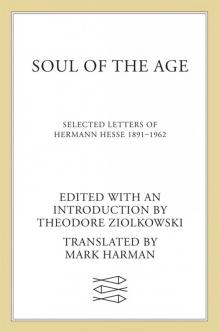 Soul of the Age
Soul of the Age